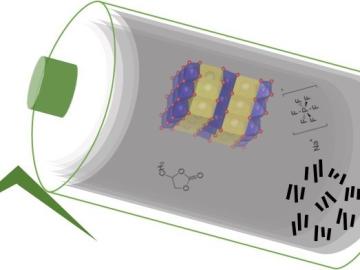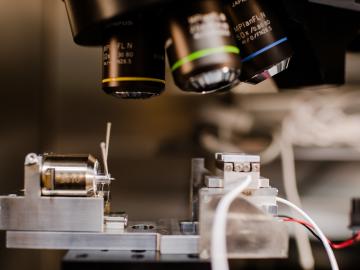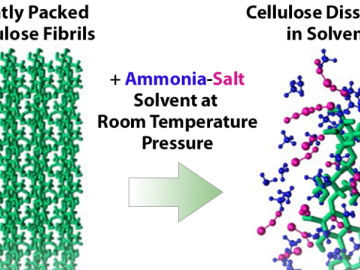
Filter News
Area of Research
- Advanced Manufacturing (1)
- Biology and Environment (4)
- Computer Science (2)
- Energy Science (36)
- Energy Sciences (1)
- Fusion and Fission (2)
- Fusion Energy (3)
- Materials (38)
- Materials for Computing (5)
- National Security (5)
- Neutron Science (34)
- Nuclear Science and Technology (10)
- Nuclear Systems Modeling, Simulation and Validation (1)
- Supercomputing (20)
News Topics
- (-) Advanced Reactors (14)
- (-) Artificial Intelligence (9)
- (-) Energy Storage (22)
- (-) Exascale Computing (4)
- (-) Grid (7)
- (-) Materials Science (39)
- (-) Neutron Science (38)
- (-) Transportation (17)
- 3-D Printing/Advanced Manufacturing (29)
- Big Data (13)
- Bioenergy (15)
- Biology (7)
- Biomedical (22)
- Biotechnology (2)
- Buildings (1)
- Chemical Sciences (5)
- Clean Water (2)
- Composites (2)
- Computer Science (45)
- Coronavirus (25)
- Critical Materials (2)
- Cybersecurity (6)
- Environment (33)
- Frontier (1)
- Fusion (14)
- High-Performance Computing (3)
- Isotopes (8)
- Machine Learning (8)
- Materials (2)
- Mathematics (2)
- Mercury (2)
- Microscopy (9)
- Molten Salt (2)
- Nanotechnology (17)
- National Security (2)
- Nuclear Energy (31)
- Physics (15)
- Polymers (7)
- Quantum Science (14)
- Security (3)
- Space Exploration (2)
- Summit (17)
Media Contacts

As the second-leading cause of death in the United States, cancer is a public health crisis that afflicts nearly one in two people during their lifetime.
A team of scientists led by Oak Ridge National Laboratory found that while all regions of the country can expect an earlier start to the growing season as temperatures rise, the trend is likely to become more variable year-over-year in hotter regions.

Researchers at ORNL demonstrated that sodium-ion batteries can serve as a low-cost, high performance substitute for rechargeable lithium-ion batteries commonly used in robotics, power tools, and grid-scale energy storage.

Energy storage startup SPARKZ Inc. has exclusively licensed five battery technologies from the Department of Energy’s Oak Ridge National Laboratory designed to eliminate cobalt metal in lithium-ion batteries. The advancement is aimed at accelerating the production of electric vehicles and energy storage solutions for the power grid.

An international team of researchers has discovered the hydrogen atoms in a metal hydride material are much more tightly spaced than had been predicted for decades — a feature that could possibly facilitate superconductivity at or near room temperature and pressure.

The formation of lithium dendrites is still a mystery, but materials engineers study the conditions that enable dendrites and how to stop them.

Rigoberto “Gobet” Advincula has been named Governor’s Chair of Advanced and Nanostructured Materials at Oak Ridge National Laboratory and the University of Tennessee.

A typhoon strikes an island in the Pacific Ocean, downing power lines and cell towers. An earthquake hits a remote mountainous region, destroying structures and leaving no communication infrastructure behind.

Researchers have developed a new process that could make it much cheaper to produce biofuels such as ethanol from plant waste and reduce reliance on fossil fuels.

Scientists at have experimentally demonstrated a novel cryogenic, or low temperature, memory cell circuit design based on coupled arrays of Josephson junctions, a technology that may be faster and more energy efficient than existing memory devices.


